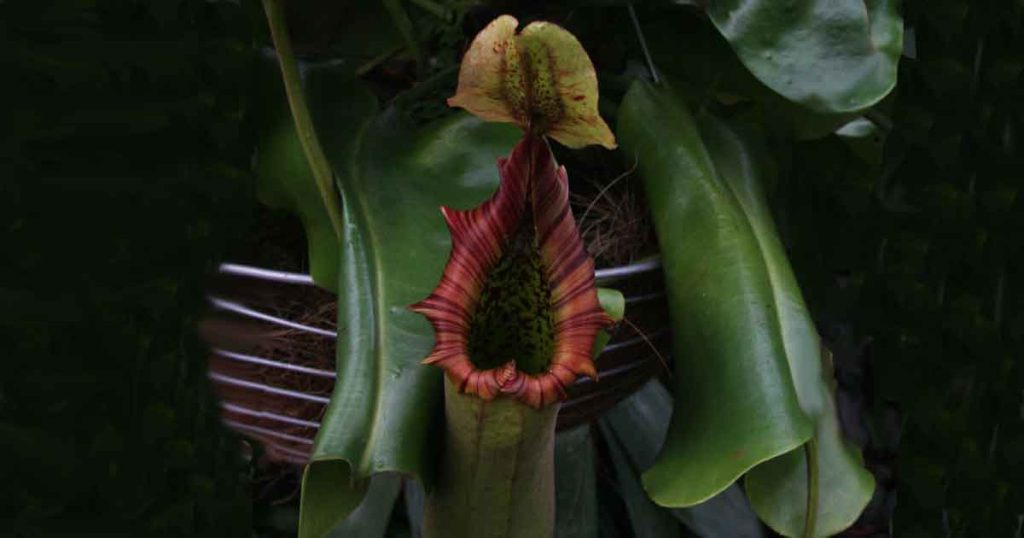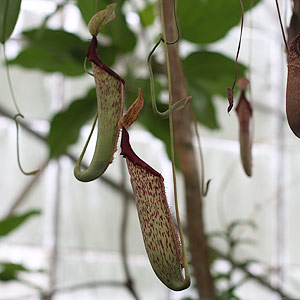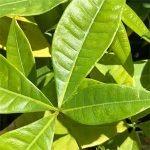
Nepenthes include some of the more spectacular carnivorous plants. Also known as Pitcher Plants’, like many other carnivorous plants Nepenthes are a climbing plant trap small insects in a cavity.
A varied group of plants with many varieties available for sale for the enthusiast, these insect eating plants are fascinating from a collectors point of view and of great interest to the average gardener.
Nepenthes are native to tropical and sub tropical areas (Malaysia, India, Australia and others the plants get their name from the hanging ‘pitchers’ that trap small insects.

In terms of care and growing conditions two groups are usually defined, firstly the lowland species, which require warmth and humidity, and are often grown in greenhouses.
The highland species are a little easier to grow for the average gardener, they will grow in cooler climates, however they still need humidity.
How to Grow Nepenthes or Pitcher Plants
Pitcher plants or Nepenthes may be grown outdoors in warmer climates or in a greenhouse, sun room or using artificial lights.
The factors of Humidity, Temperature, Light, Moisture and growing medium (soil) are the most important. These factors will vary depending on the species.
Humidity
As a rule humidity is the most important factor in growing pitcher plants successfully. Try for 50% humidity as a minimum for all species.
Temperature
This will vary depending on the species.
- The Lowland species will require 77F – 100F during the daytime and dropping to no lower that 60F at night. They also like a little more humidity.
- Highland species require around 77F during the day and can drop to 60F at night.
- And just to make things interesting, a group that fall between these two, will require appropriate temperatures.
Light
Nearly all species grow best in good light, full sun. However they need the humidity as well. So in less humid zones try strong filtered light.
Water
All Pitcher plants like water, they also like a free draining soil. This gets back to the humidity. So the old method of sitting the container on pebbles in a tray filled with water can help with the humidity. Water well, but allow the soil to dry just a little. Never allow the soil to become water logged.
Fertilizer
In an ideal environment, Nepenthes would require no fertilizer at all. They would survive from the insects that they catch. However most growers use a little liquid seaweed fertilizer or similar every few months.
If all that seems a little to difficult, look form the hybrids such as the N. ventricosa x N.maxima hybrids. They are generally a little hardier and more forgiving for the beginner to grow.
Nepenthe Varieties
Although many species are available, including some hybrids, some are easiest than others. The most popular species include:
- Nepenthes rajah
- Nepenthes attenbourghii
- Nepenthes miranda
- Nepenthes rafflesiana
- Nepenthes alata
- Nepenthes truncta
- Nepenthes ventricosa
Propagation
The easiest method of propagation is from stem cuttings.
These can be taken at any time, however the plant does need to be healthy and preferably showing signs of active growth. You will need a propagating mix that is free draining, sterile and free of nutrients and salts.
The stems are cut so that they have 2 nodes. They are inserted into the growing medium and then kept warm and humid until new growth commences.
This is a fairly simple explanation, if you are really enthusiastic, we suggest joining your local carnivorous plant society for some expert instructions.
You can buy Nepenthes online from the following nurseries
PREDATORY PLANTS – phone – (650) 720-5195
email – info@predatoryplants.com
Specializing in carnivorous plants. venus flytraps, pitcher plants, nepenthes, sundews, sarracenia
www.predatoryplants.com
CASCADE CARNIVORES – phone: 4253515967
13340 SE 79th PL Newcastle WA postcode: 98059
Carnivorous plant nursery located in Washington state offering tropical pitcher plants, butterworts, Dewy Pines and more. We ship Dewy Pines plants. US sales only.
www.cascadecarnivores.com

